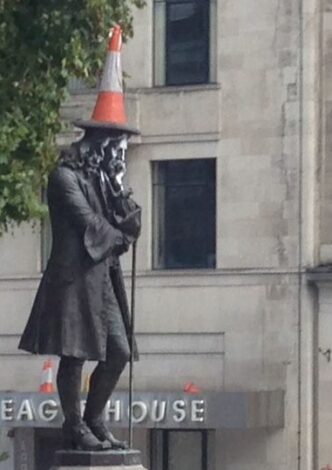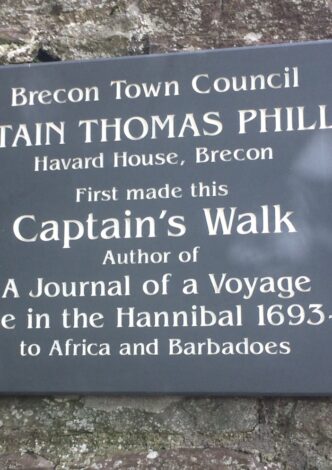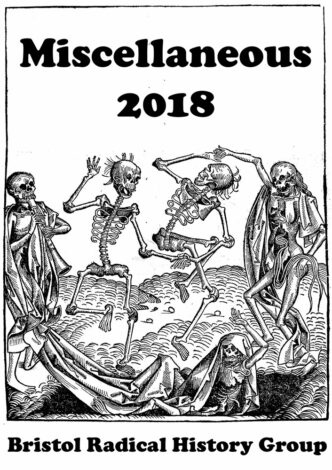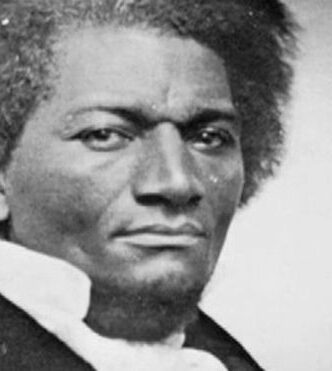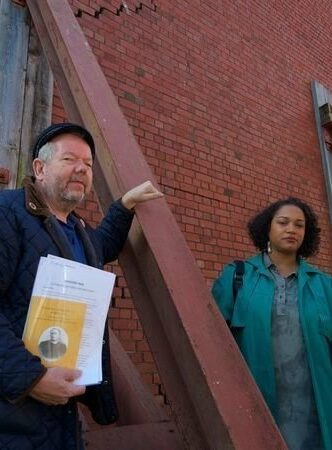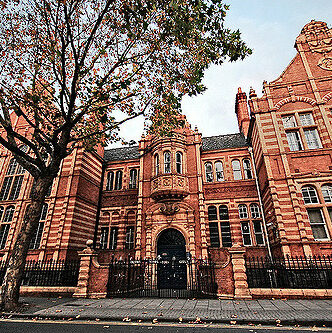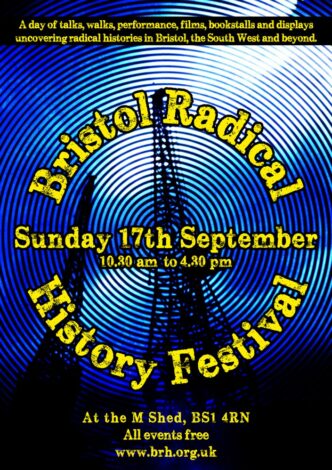In the light of recent moves to place a ‘corrective’ plaque on the statue of Edward Colston in the centre of Bristol and calls for it to be removed to a museum it seems the time is right to investigate the origins of this monument and the claim emblazoned on it that it was: Erected by citizens of Bristol as a memorial of one of the most virtuous and wise sons of their city Looking into the history of the statue demonstrates the same myth making that has characterised the popular memory of […]
If you were to walk around the rear side of the former house and home of Captain Thomas Phillips in Brecon, located along Captains Walk, you will notice a rather handsome slate plaque memorialising his life. The Phillips’ family house is now St Ursula’s Convent, a former catholic school. The plaque was paid for by the people of Brecon, and was erected (though not without controversy), in 2010. It reads innocently enough: CAPTAIN THOMAS PHILLIPS Havard House, Brecon First made this Captain’s Walk […]
In the summer of 1846 the famous American abolitionist Frederick Douglass took to the stage of the Victoria Rooms in Bristol, enthralling his thousands-strong audience with vivid denunciations of slavery. He was feted by the mayor and received great support from the people of the city, maintaining friendships with many of those he met for the rest of his life. Douglass biographer Laurence Fenton will discuss the background to and details of the great abolitionist's visit to Bristol in a talk at […]
After the Frederick Douglass event in the city on Bank Holiday Monday (28 May, 2018) in which BRHG members took part and which drew several hundred people we are publishing this article by Laurence Fenton. Laurence has just written a new book on the African American abolitionist's visits to Victorian Britain and is calling for a more permanent memorial to this important moment in the history of the city and the struggle against slavery. BRHG fully support this initiative. While actions from the […]
Sign the petition. Throughout time Bristol has played a key role in events, ideas and literature that have shaped people’s freedom and parliamentary reform. Previously these topics have been neglected because they don’t quite fit the national narrative. The narrative has to change for the 21st Century. By recognising this there’s a great chance Bristol can lead the way. For a fleeting moment there’s a golden opportunity to make it happen; a vital retelling of the role Bristol has played on the […]
Introduction On 11th November 2017 Colston's Girls’ School (CGS) announced that they would not be changing the name of the school, despite its associations with Edward Colston, the Bristol merchant who both organised and profited from the transatlantic slave trade. Colston was a major investor, manager and then deputy-governor of the Royal African Company (RAC) which held a monopoly over the West African slave-trade in the seventeenth century.] During Colston’s time managing and then leading the […]
 Not A BRHG Event
Not A BRHG Event
11.30am Redcliffe Caves, Phoenix Wharf, Redcliffe Way, Bristol BS1 6SR Walk ends at Bristol Cathedral at 1.30pm (approx.) After popular demand the Countering-Colston group are re-running their recent history walk. Starting with St Mary Redcliffe church, this walk takes in other historic Diocese of Bristol churches in the city centre where ‘the life and work’ of Edward Colston is still provided religious legitimacy on an annual basis. Along the way we will share the most recent historical […]
 Not A BRHG Event
Not A BRHG Event
Artists’ video installation at the Bearpit, (underpass to Broadmead shops) St James Barton roundabout, BS1 3LY Shot in landscapes of Eastern Nigeria, Nevis & Greenbank cemetery Bristol UK, played on a loop in the Bearpit unfolds a human story in a trilogy of artist video film shorts that renders visible three generations of 18th century African women from one family separated by the transatlantic trade in human trafficking; Fanny (Fumnanya) Coker, her mother Igbo Polly (Adaeze) & […]
 Not A BRHG Event
Not A BRHG Event
An international team of artists and film-makers are working together to resurrect the voices of three generations of women impacted by British slavery in a digital installation: Daughters Of Igbo Woman. Events will take place in Bristol at Georgian House Museum and Greenbank Cemetery in August and the Bearpit in October this year, accompanied by school workshops. Daughters of Igbo Woman is supported by Arts Council England, Bristol Culture and Journeys to Justice. Ros Martin, Project Director […]
A series of 10 minute 'taster talks' covering recently or soon to be published Bristol Radical History Group texts. These include: Lady Blackshirts: The Perils of Perception – suffragettes who became fascists [Rosemary Caldicott] During the 1930’s a small group of ultra-nationalistic women, who considered themselves feminists, joined Oswald Mosley’s British Union of Fascists. Surprisingly some of these women were former high ranking members of the suffragette movement. The Smoke-Dragon and How […]
